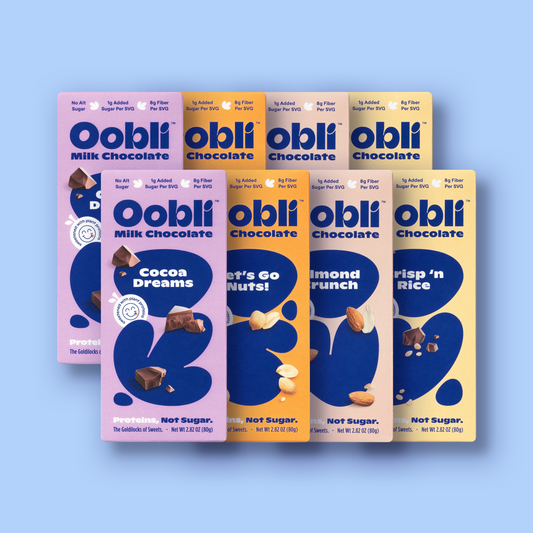It’s January 1. By now, I’m sure your inbox is like mine: flooded with big bold New Year’s resolutions and weight-loss challenges signups, intense gym membership pushes and every other kind of glorified challenge to get you and keep you healthy through January with restrictive eating and other unsustainable programs.
But what does the actual research say on resolutions and challenges?
New Year’s resolutions do actually have the ability to give someone a “fresh start” perspective, and they can in fact be motivating to make actual change.
But most fail. Why?
By far, the number one factor to resolution failure is thinking too big! That’s right. While we all want substantial, sustained change, moving the big needles often takes dozens of steps before we can actually get there. The better path: set small, achievable goals. I mean, you wouldn’t learn a new language by trying to speak fluently in a few days right? Small steps can lead to big change. But those steps often have to pay off for us, and our goals need to be something that’s not just an added bonus if we achieve them: we need to ask ourselves why we really want to make a change.
Keeping resolutions fun, simple yet necessary can really pay off if the resolution is something we really can’t live without. So if you’re expecting us to roll out one of those big-time, slog-like fitness challenges this month, you’ll want to look elsewhere.
Because we’re flipping the 31-day challenge on its head, and rolling out our version: the 2025 Oobli New Year’s Challenge. Thirty one days of easy peasy, health tips, giveaways, exclusive discounts and more fun stuff all centered around cutting back on sugar in super simple ways. And because reducing sugar — specifically added sugar — in our diets is one of our reasons for being here at Oobli, this is the core underlying theme to this challenge.
Because when we cut added sugar, all health boats rise. Put simply, we get healthier when we eat less sugar.
Join our 2025 New Year's Challenge on Instagram!

Oh and did I mention, you have a shot at winning a year’s supply of Oobli chocolate?
Still not convinced?! Here’s some reasons cutting out added sugar can have a big impact, even if you take small steps to get there!
The Health Benefits of Reducing Added Sugar in Your Diet
In recent years, a growing body of research has shed light on the negative impact that excess added sugar can have on our health. While sugar/glucose can play an important role in our bodies, the focus is increasingly on added sugar — the type found mostly in processed foods and sugary drinks — as a major contributor to chronic diseases. By reducing added sugars, all health boats rise, lowering the risk of developing chronic conditions.
We’re naturally wired with a sweet tooth, and a little sugar is completely normal in a whole-food diet especially when we’re active. But our modern food system is overwhelmed with added sugars in ultra processed foods, and that’s where the breakdown happens. Research has started connecting the dots, too.
The Dark Side of Added Sugar
Heart Disease
Research from 2024 underscores the link between high sugar intake and cardiovascular disease. A study examined the dietary habits of over 100,000 participants and found that adding one sugary drink per day was associated with a roughly 18% increased risk of CVD regardless of how much a person exercised.
Type-2 Diabetes
A meta-analysis reinforced these findings, showing that individuals that consumed the most added sugar from beverages had a 26% greater risk of developing type 2 diabetes.
Improved Cognitive Function and Mental Health
In addition to its physical effects, reducing added sugar intake has been shown to have a positive impact on mental health and cognitive function. A 2024 study in BMC Psychiatry reviewed the effects of sugar on mood and behavior, concluding that high sugar consumption is linked to an increased risk of depression.
Similarly, studies have suggested that cutting back on added sugars can improve cognitive function. A review published in Frontiers in Aging Neuroscience found that diets high in refined sugars were associated with impaired memory and slower processing speed. The reduction in sugar led to better brain health, especially in older adults at risk for Alzheimer's disease.
Gut Health and the Microbiome
And finally, the effects of sugar on our gut are finally coming to light. Research is starting to show how excess sugar consumption can create microbial dysbiosis leading to inflammation and intestinal permeability.
Join our New Year’s Challenge for Easy, Practical Tips for Reducing Added Sugar
Making the decision to cut down on added sugar can be challenging, but we believe the benefits to your health can be monumental. And taking baby steps can get you there! While our challenge has special discounts on Oobli chocolate, giveaways, puzzles and more, we also sprinkle in simple health tips that make it easy and actionable to watch your sugar intake.
Join the 2025 Oobli New Year’s Challenge!




